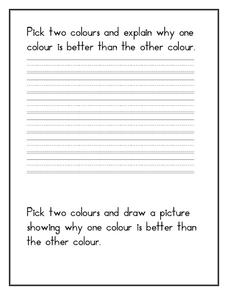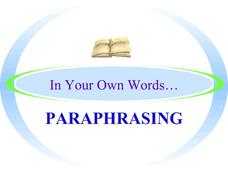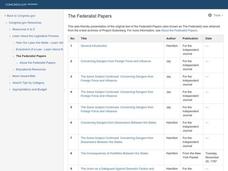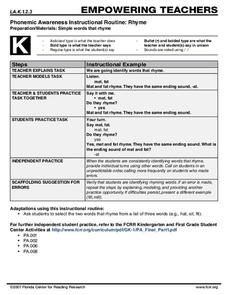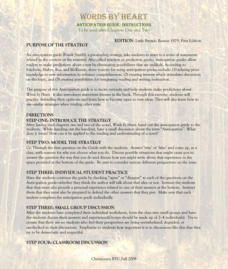Room 108
Writing Exercise: Why Is One Color Better than Another?
Compare and contrast why one color is better than another in a short-answer format. After kids finish their writing assignment, they can also draw a picture to illustrate why one color is better.
East Stroudsburg University
In Your Own Words... Paraphrasing
How can you put a passage in your own words without changing the meaning of the original text? That is the question facing many young researchers. The advice modeled in this presentation is that writers read the passage carefully,...
Curated OER
New Jersey State Word Jumble
In this word scramble learning exercise, students use the words in the word bank to unscramble nouns and proper nouns about the state of New Jersey. Students unscramble 20 words.
Curated OER
"Pray, Why Speakest Thou Thusly?"
Examine popular language and slang and how they have changed over the course of American history. Conduct Internet research, use an online interactive Colonial House website to translate 17th century language into 21st century language,...
Dorling Kindersley
Question Words
Teaching your primary learners how to ask questions? Then look no further. This worksheet introduces the six essential question words: who, what, where, when, why, and how. Children begin by practicing how to write these words, before...
Curated OER
Predicting the Meaning of Unfamiliar Words in a Text
Middle schoolers develop strategies for what to do when they come upon words in a text that they don't know. After a class discussion, pupils are given a selection of text that contains some very difficult words. They are instructed to...
Curated OER
The Use of Language in "I Know Why the Caged Bird Sings"
Readers of I Know Why the Caged Bird Sings are asked to craft an essay in which they compare how Maya Angelou uses figurative language to depict herself and Mrs. Flowers.
August House
Why Koala Has a Stumpy Tail
Learn about the animals of Australia with a language arts lesson about an Australian folktale called, Why Koala Has a Stumpy Tail. After reading the story as a class, kids discuss events and characters from the book, retell the story to...
Curated OER
Adventures in Earth Day: Why Do We Care About Our Environment? - Biology Teaching Thesis
Learners are introduced to Earth Day and the importance of this day. They make a collage, students can use articles, pictures, words, etc., in magazines or newspapers or online, that relate to Earth Day, the environment and environmental...
K12 Reader
Why Does the Moon Orbit Earth?
Have you ever looked up at the moon and wondered why it looks different every night? Learn about the moon's orbit and the lunar cycle with a reading comprehension exercise. Using context clues, kids find the definitions of unfamiliar...
Curated OER
Word Pair Analogies 8 (high-advanced level)
Originally designed for those studying for the GRE, you could also use this worksheet in your advanced eleventh or twelfth grade English classroom. Learners study word pair analogies and then write a sentence explaining why they chose...
EngageNY
Why Were Logarithms Developed?
Show your class how people calculated complex math problems in the old days. Scholars take a trip back to the days without calculators in the 15th installment of a 35-part module. They use logarithms to determine products of numbers and...
Virginia Department of Education
Developing an Essay: Word Choice
Grading essays after reading a novel written by a lyrical master (think Nabokov, Morrison, Chabon) is a deflating experience. Why can’t your student’s display the same skill in diction as your favorite writers? Because you did not use...
EngageNY
Vocabulary: Finding the Meaning of Words in Context in The Boy Who Loved Words
Here is a lesson plan that invites learners to engage in a kinesthetic activity that allows them to physically move and manipulate words in order to think about ways to understand vocabulary in context. After that activity is complete,...
Curated OER
Identifying and Generating Rhyming Words, Memory
Engage your class in a game where they look for matching rhymes. They will flip over cards and look for rhyming words. If the words match they keep the cards. If they words do not match they turn the cards over. Additionally, they will...
Curated OER
The Final Word
Although this lesson is based on “Final Word,” Craig Wilson’s USA Today column, the strategies could be adapted to any local columnist. After reading three articles independently, groups share observations about content and style used by...
Curated OER
Reading a Classic Novel
Charles Dickens offers an excellent example of sensory writing in this reading comprehension worksheet. Learners read excerpts from the novel Hard Times in which he describes the New England industrial city of Coketown. They consider why...
Curated OER
Commonly Confused Words Exercise
Accept or except? Advice or advise? Eminent or imminent? Which is which witch? In order to select the correct word to complete 20 sentences, learners get out their dictionaries and check the meaning and usage of the commonly confused pairs.
Florida Center for Reading Research
Phonemic Awareness Instructional Routine: Rhyme
As a class, kindergarteners identify rhyming words. The teacher provides an example of a rhyming pair and explains why they rhyme. Individual learners then respond by saying a word that rhymes with a given word.
Novelinks
Words By Heart: Anticipation Guide
The anticipation guide for Words by Heart is the first of a series of six, contains lesson plans for the activity as well as a handout to be completed individually, in pairs, or as a class. It sparks interest for the text and activates...
Southern Poverty Law Center
Analyzing How Words Communicate Bias
Words are powerful ... can your class choose them wisely? Scholars evaluate news articles to discover the concepts of tone, charge, and bias during a media literacy lesson. The resource focuses on recognizing implicit information and...
Open Oregon Education
The Word on College Reading and Writing
Many people struggle putting their words into writing. However, writing does not have to be difficult. The Word on College Reading and Writing offers all areas of support for writers and readers. The text takes literature lovers all the...
ReadWriteThink
A Picture's Worth a Thousand Words: From Image to Detailed Narrative
A picture's worth a thousand words—and even more inspiration! A visual activity uses photographs to inspire writers. The process teaches aspects of narrative writing, such as point of view and characterization.
Curated OER
Multiplication and Division Word Problems Made Easy
Marbles to learn math? What fun! Discuss the rules of multiplication and division when applied to whole numbers, decimals, and fractions. Small groups use6 marbles to design different types of multiplication and division problems, and...


